
On Monday, I was pleased to be able to welcome twelve people of faith as they were honored as White House “Champions of Change” for their efforts in protecting our environment and communities from the effects of climate change. These Champions have demonstrated clear leadership across the United States and around the world through their grassroots efforts to green their communities and educate others on the moral and social justice implications of climate change.
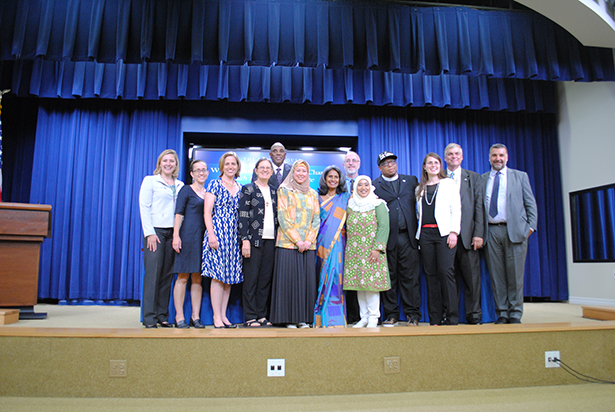
The Champions shared personal reflections on their efforts in advance of the event:
Huda Alkaff
Believe it or not, I have been an environmentalist since I was a child. I was curious to learn more about nature, its inhabitants, and the connections between them.
Ecology is the study of interconnections and interdependence among everything in space and in time. Prophet Muhammad (peace be upon him) is reported to have said:
If doomsday is about to take place while anyone of you have? A sapling in his/her hand, which he/she can cultivate, let him/her cultivate it for he/she will be rewarded.
I see this as a call for active hope.
My little sapling is the Islamic Environmental Group of Wisconsin -- now called Wisconsin Green Muslims -- and interfaith environmental work. We consider environmental justice (the right for clean air, pure water, healthy food, good sanitation, etc.) as a human rights issue. Our goal is to work with others to make environmental and climate justice a reality for all. We have a large network of collaborators and together we are strengthening our collaboration and environmental justice “muscles and mindsets” to better serve and protect the poor, marginalized, vulnerable and disadvantaged populations and our common future. We are making a difference!
Huda Alkaff is the Founder and Director of the Islamic Environmental Group of Wisconsin (Wisconsin Green Muslims), formed in 2005.
Steven Beumer
When I was child growing up one of my favorite pastimes was getting a big book of connect the dot puzzles and working away on them. It was amazing to see the dots turn into dogs and fire trucks. Our faith communities have many “dots” imbedded in our traditions that address many issues. The environment is one of them. People of faith all share a great reverence and awe for what God has created.
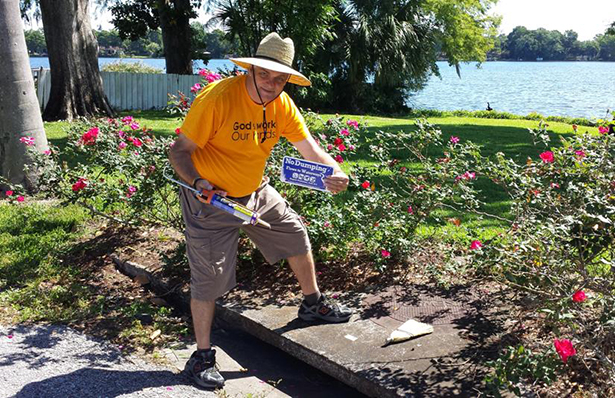
As we work to connect those dots in our respective faith traditions we see the illusion of our separation fade away. We become closer and bound together as we can celebrate our love of God’s creation—and rejoice in our work to protect it. People of faith share a unique perspective on the environment. We are not a social club, political group or secular advocacy organization, but our very existence is bound up in our oneness as a product of God’s creation. It is most important to take the moral initiative, to shine a light on the need to cherish and protect the sum total of the wonderful parts that make up all creation—people, plants and animals that grace every corner of our amazing planet.
Steven Beumer is an active member of St. John Evangelical Lutheran Church in Winter Park, Florida and a small business owner.
Sister Joan Brown
Two decades ago, the liberation theology concept, “Preferential Option for the Poor and the Earth” brought me to Southern New Mexico. Climate change and water issues were growing. Those with few economic means would suffer most. Tierra Madre, a self-help strawbale housing project emerged.
The call to help people make the connections between spirituality, faith and environment led to co-creating the Partnership for Earth Spirituality and then into helping establish New Mexico Interfaith Power and Light (NMIPL). NMIPL is the only religious based organization working on climate change in the Land of Enchantment.
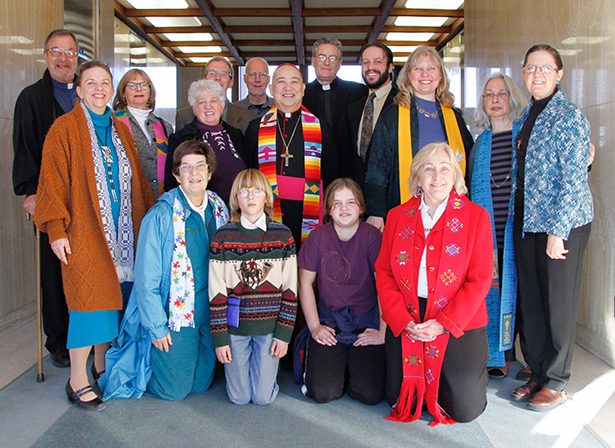
We take a three pronged approach as an agent of hope. Education and inspiration programs lead to practical actions of energy efficiency and installation of solar in houses of worship and homes. Finally, policy advocacy addresses moral and ethical implications in efforts to phase out coal fired power plants in the Four Corners Region, support renewable energy legislation, highlight concerns for water, gather postcards and comments on the EPA Clean Power Plan, and work for the Green Climate Fund. The papal encyclical, Laudato Si, offers exciting new opportunities to grow our work.
Sr. Joan Brown, Order of St Francis is a Franciscan of the Rochester, Minnesota Franciscans, Executive Director of New Mexico Interfaith Power and Light, and regular contributor National Catholic Reporter Global Sisters Report.
Cassandra Carmichael
My mother gave me a foundational education on relationships when I was less than eight years old. As we walked through the Virginia forests, gazing at wildflowers, I began to silently search for God and cement a divine relationship that would drive me to work hard to protect God’s good creation. In the early days of my environmental career working with churches, I couldn’t imagine a world where others could not seek relationship with God in creation just as I did as a child.
However, it was on a balmy day in August 2005, as I watched news of my hometown of New Orleans under siege from Hurricane Katrina, that my worldview shifted and I discovered the true definition of relationship. I could no longer be content with a singular relationship with God without also seeking right relationships with my “neighbor.” I learned then that right relationships dictate that we look beyond our own interests and bear the burdens and hopes of others. And on that August day, it became clear that protecting people and God’s planet are linked and to truly be in a relationship with God we must also be in right relation to each other and the rest of God’s creation.
Cassandra Carmichael is the Executive Director for the National Religious Partnership for the Environment.
Patrick Carolan
I am blessed and honored to be selected as a Champion of Change. Pope Francis recognized God’s presence in creation, and praised it in his recent encyclical. He celebrated the beauty of God in creation, and loved God all the more for this gift. As people of faith, we are called to use our prophetic voices to speak for those least able to defend themselves, especially the poor, children, and future generations who will suffer the most from global meltdown.
At the Franciscan Action Network (FAN) part of our strategy has been to build relationships and collaborate with other faith and secular organizations. In that light, we have been involved with bringing together a diverse group of climate organizations. Beginning in 2014, FAN spearheaded the coordination of Catholics for the People’s Climate March. We continue to organize Catholics for the inter-faith OurVoices Campaign. I helped co-found the Global Catholic Climate Movement (GCCM), a coalition of Catholic leaders and organizations from across the globe coming together to raise awareness about the urgency of climate action in light of Catholic social and environmental teachings. We are currently engaged in a climate petition where we hope to get over 10 million signatures.
To be a Champion of Change we need to choose love, we need to choose interbeing over separation. And, we need to choose our shared future over an unhealthy planet for our children and grandchildren.
Patrick Carolan is the Executive Director of the Franciscan Action Network and a co-founder of the Global Catholic Climate Movement.
Gerald Durley
Climate change is a civil rights issue. We are seeing its impacts in our own communities in the form of record-breaking temperatures, floods, droughts, hurricanes, and the list goes on and on. When your children suffer from asthma and cannot go outside to play, as is the case for many in America’s most disenfranchised communities, it is a civil rights issue. When unprecedented weather disasters devastate the poorest neighborhoods in places like New Orleans, New Jersey, and New York, it is a civil rights issue. When farmers in faraway lands cannot feed their families because the rains will no longer come, it is a civil rights issue.
I do not doubt that we will succeed in addressing climate change. After all, we have only scratched the surface when it comes to solutions such as energy efficiency, renewable energy, and preparedness. But our success rests on the willingness of all of us -- all races, creeds, and walks of life -- coming together with a single purpose.
Reverend Gerald Durley is the former Dean of Clark Atlanta University, the former director of the Health Promotion Resource Center of the Morehouse School of Medicine, and former pastor of the historic Providence Missionary Baptist Church.
Nana Firman
What we are witnessing in our world today is the failure of humanity to maintain the balance, and that failure has led to profound consequences for the land, the sea, and all of the creatures within. Over the years, I have worked with Muslim communities in Indonesia and beyond and come to understand the dangers that these communities face from the rising of sea level as the direct impact of climate change. The Qur’anic exegetes gave us an interpretation that describes the corruption in the land and the sea by means of humans’ hands, such as the drying up of the rains, the disappearance of the harvest of the sea, and other ecologically relevant meanings. With that said, it is very important for our world leaders to hear the moral urgency on this issue like never before.
That is what “OurVoices” is about and this is why I am involved. My hope is for all Muslim leaders to get involved to make the significant changes we want to see in this world and in the near future. Because of where we live around the world, Muslim communities are facing the greatest risk from climate change. Should we act now, we can still avert many upcoming disasters, such as global warming and the associated climate changes. Should we fail to do so, we are only accelerating our collective demise.
Nana Fitriana Firman is the Muslim Coordinator for OurVoices, a global faith and spiritual climate action network.
Rachel Lamb
In the fall of 2012, at a major political event in New York, a curious journalist approached members of our faith-based climate organization with some suspicion. There were a number of colorful groups rallying for attention there, and from his perspective, a group claiming to be “young evangelicals” advocating for action on climate seemed as likely to be a group of pranksters playing a joke as an actual organization with serious goals.
Although our name may initially be a surprise to some, Young Evangelicals for Climate Action (Y.E.C.A.) succinctly captures the richness of our organization’s identity and mission.
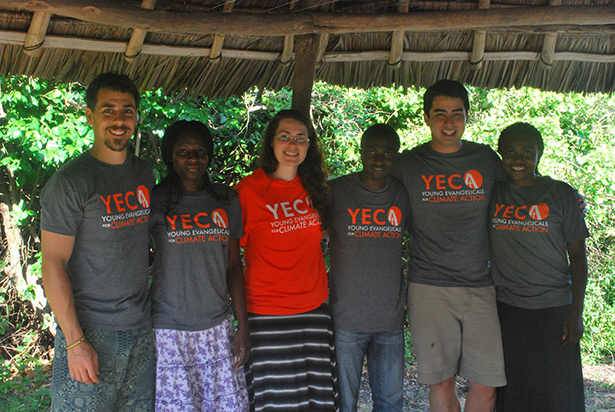
As young people, we are concerned about our future and are stepping up to address what is becoming a defining challenge for our generation. As evangelicals, we are embracing the call to make God’s mission our mission, and the Bible teaches us that God’s mission is about bringing reconciliation and restoration to all things, on earth as it is in heaven. And, finally, we are focused on action—loving, faithful, and hope-filled action—wherever there is conflict amongst people and between people and the environment.
This is what we are about at Young Evangelicals for Climate Action. We care about climate change, not in spite of being evangelicals, but precisely because of our faith. Y.E.C.A. has only been around for a few years, but our numbers continue to grow, and we look forward to the day when people will normatively come to know of evangelical Christians as being faithful leaders in addressing the great moral challenge of climate change.
Rachel L. Lamb is the Chair of the Steering Committee for Young Evangelicals for Climate Action (Y.E.C.A.), a ministry of the Evangelical Environmental Network.
Reverend Kim Morrow
It’s happened more than once: I have stood up to testify on a climate-related issue at the Nebraska State Legislature or at a public power district meeting, and when I start speaking, the room gets quiet enough to hear a pin drop. That’s not because of any rhetorical flourish on my part—it’s because of the power of using timeless moral wisdom to protect our earth and our people. When those words are spoken, people listen.
Some might say that Nebraska is a bad place to do faith-based climate advocacy, but I think it is the best. Red states like ours are the front lines of climate work right now. This is where change is happening that can have far-reaching consequences.
Almost every Nebraskan is remarkably connected to the land; either they grew up on a farm or their ancestors did. City dwellers still garden, sense the rhythms of drought or deluge in their bones, and, by necessity, live with a constant humility in the face of biting blizzards and stifling heat. These people know deeply the meaning—and the risks—of being intertwined with the weather.
Most of them also know that the weather isn’t behaving the way it used to. My work is to help connect the dots for people between care for God’s creation, the reality of climate change, strategies for mitigation and adaptation, and most of all, hope. Our faith communities have remarkable resources to greet the climate crisis with constructive action that will make a real difference—for Nebraska and for the world.
Rev. Kim Morrow is the Director of Nebraska Interfaith Power & Light, a climate change resource specialist at the University of Nebraska, and an adjunct minister of sustainability at First-Plymouth Church in Lincoln.
Rabbi Marc Soloway
As a rabbi, I have used my pulpit to bring attention to the devastating effects of climate change and I have challenged the congregation and wider community to think and act, especially around food. The earliest story in the Torah calls Adam and Eve and their descendants, us, to partner with God as shomrei adamah, guardians of the earth.
In partnership with inspiring individuals and organizations like Hazon, for which I chair the Rabbinic Advisory Board, Ramah of the Rockies, a sustainable Jewish summer camp and Boulder’s Jewish Community Center, some wonderful, grassroots initiatives have emerged, including an interfaith Community Supported Agriculture (CSA) program, a community garden and Jewish goat co-op.
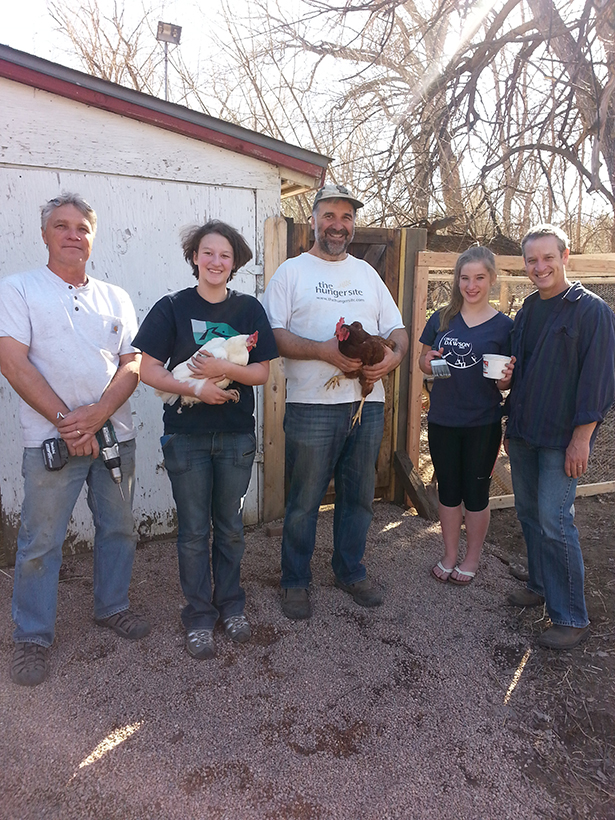
My synagogue, Bonai Shalom, was the first to be zero-waste, and our Ner Tamid, the perpetually burning light in our sanctuary, is powered by a solar panel, as a constant reminder that spiritual life must be sustainable and in harmony with our planet.
These types of changes can be replicated in any local community that wishes to participate in the New Jewish Food Movement helping us get closer to the Torah’s vision of stewardship and connection to the earth.
I share this honor of a Champion of Change with so, so many activists, farmers, educators and visionaries who work hard every day to make a difference in our environment, creating a more sustainable world.
Rabbi Marc Soloway is the spiritual leader of Congregation Bonai Shalom in Boulder, Colorado and chair of the Rabbinic Advisory Board for Hazon.
Sunita Viswanath
Sadhana: Coalition of Progressive Hindus (Sadhana means faith in action) is an all-volunteer group of New York-based Hindus. Our purpose is to bring a progressive Hindu voice into the public discourse, and to live out the social justice principles at the heart of Hinduism. One such principle is ahimsa, which forbids violence against all beings, so that we can realize our connection to each other and nature. Through our grassroots green project, Project Prithvi (Mother Earth), we mobilize Hindus, especially the youth, to live out the principle of ahimsa by taking care of the environment.
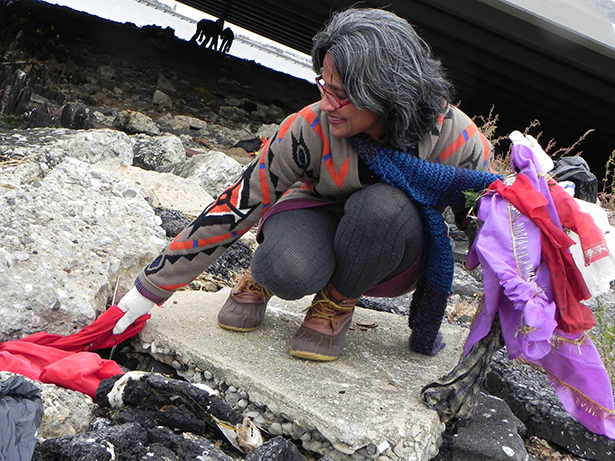
We have adopted a beach in Jamaica Bay, New York, where Hindus worship. Devotees place their offerings into the bay, but the offerings wash up on shore and become entangled with all the litter lining the beach – beer bottles, Styrofoam containers, used condoms. It is deeply painful to see our religious offerings, broken idols, trays of flowers and fruits, fabrics that had adorned the deities, washed up on the beach as garbage. We reach out to local Hindu temples, and we enlist priests to help us advocate that devotees worship in more environmentally friendly ways. We mobilize temple-goers to participate in our monthly beach clean ups. Every month, devotees tell us how hurt they are to see broken idols of Ganesha and Lakshmi lying face down in the dirt; the contradiction between worshipping Mother Prithvi and polluting the beach is immediately apparent.
Hindus believe that the same divine spirit is inherent in every one of us, regardless of race, gender, religion, caste, even species. Once we embrace this interconnectedness, there is no more selfish action. We see that polluting the environment, discriminating against others, committing acts of violence and injustice, and even being silent in the face of injustice, are acts which are harmful to the universe, and harmful to ourselves.
Sunita Viswanath is co-founder and active board member of the 14-year-old front-line women’s human rights organization, Women for Afghan Women.
Reverend Lennox Yearwood Jr.
August 29, 2005, the day Hurricane Katrina hit New Orleans, is the day that changed my life.
Ever since it has been my moral and spiritual obligation to fight for the poor and people of color devastated by natural disasters caused by climate change. Climate Change is our “lunch counter moment” for the 21st century. It is the biggest threat to justice and opportunity our planet has ever seen.
I believe it is a civil right for everyone to have clean air and water, and the only way to achieve this is by having comprehensive climate/clean energy legislation, and by ending the fossil fuel economy. My three goals going forward are: to bolster the climate movement using popular culture; to grow the climate movement in size by increasing its diversity; to move people to action on a climate issue agenda that employs political, economic, and cultural strategies to transition our world to a clean energy future.
By building support for the climate movement among cultural influencers, and working with some of the most amazing people in the climate movement, I’m well on my way to achieving these goals. Last fall the Hip Hop Caucus and many environmental groups came together to create People’s Climate Music. This has led to the first ever climate album, HOME, featuring such artists as Common, NE-YO, Elle Varner, Raheem DeVaughn, Malik Yusef and numerous other artistic luminaries. I believe that when our greatest cultural influencers, who already have the world’s ear, reframe the conversation, the political process and economic investment will follow.
Reverend Lennox Yearwood Jr., President and CEO of the Hip Hop Caucus, is a Church of God in Christ Elder and community activist.
Angela Barranco is Associate Director for Public Engagement at White House Council on Environmental Quality.

